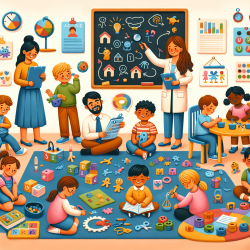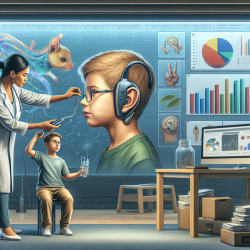The College Students’ Sense of Responsibility for Innovation and Entrepreneurship is a comprehensive study that offers valuable insights into how positive psychological qualities can enhance college students' sense of responsibility in innovation and entrepreneurship. This research is particularly relevant for practitioners in online therapy services like TinyEYE, who aim to foster great outcomes for children by integrating innovative and entrepreneurial skills into their educational programs.
Key Findings from the Research
The study analyzed responses from 1,500 college students using various statistical methods such as ANOVA, factor analysis, and linear regression. The findings revealed that positive psychological qualities such as syngroup, excellence, bravery, modesty, benevolence, super-excellence, restraint, and wisdom significantly influence students' sense of responsibility in three key areas: individual, team, and social responsibilities.
Individual Responsibility
The research found that:
- Individual responsibility scores were significantly different across grade levels, with higher scores in higher grades.
- Excellence was the most significant predictor for individual responsibility.
Team Responsibility
For team responsibility:
- Positive qualities like benevolence, excellence, bravery, restraint, and wisdom reached significant levels.
- Wisdom had the highest impact on team responsibility.
Social Responsibility
Regarding social responsibility:
- Wisdom again had the highest coefficient, indicating its strong predictive power.
- Qualities like syngroup, excellence, bravery, and modesty also played significant roles.
Implementing Research Outcomes in Practice
Practitioners can leverage these findings to improve their skills and outcomes in several ways:
Create a Positive Cultural Atmosphere
- Organize activities that promote entrepreneurial spirit, such as watching biographies of successful entrepreneurs or visiting innovation hubs.
- Invite successful entrepreneurs to give motivational speeches to inspire students.
- Facilitate exchange programs where students can share their entrepreneurial experiences and challenges.
Build a First-Class Team of Entrepreneurial and Innovative Teachers
- Establish a dedicated team of teachers with advanced teaching concepts and scientific methods.
- Incorporate traditional cultural philosophies to help students understand and accept themselves, thereby improving their positive personalities.
- Adopt immersive and experiential learning methods to make practice teaching more engaging and effective.
Develop a Scientific Curriculum System
- Integrate mental health education into the curriculum to strengthen students' psychological quality.
- Focus on positive psychological qualities in the curriculum to help eliminate negative traits and enhance positive ones.
- Continuously evaluate and update the curriculum based on student needs and feedback.
Encouraging Further Research
While this study provides valuable insights, there is room for further research to explore the influence of positive psychological qualities on innovation and entrepreneurship responsibility in different cultural contexts. Additionally, future studies could delve deeper into the structural equation models and intermediary factors affecting this relationship.
Conclusion
The integration of positive psychological qualities into educational programs can significantly enhance students' sense of responsibility for innovation and entrepreneurship. Practitioners can adopt these research outcomes to create a more conducive learning environment, build a robust teaching team, and develop a comprehensive curriculum that fosters innovation and entrepreneurial skills among students.To read the original research paper, please follow this link:
The College Students’ Sense of Responsibility for Innovation and Entrepreneurship.










